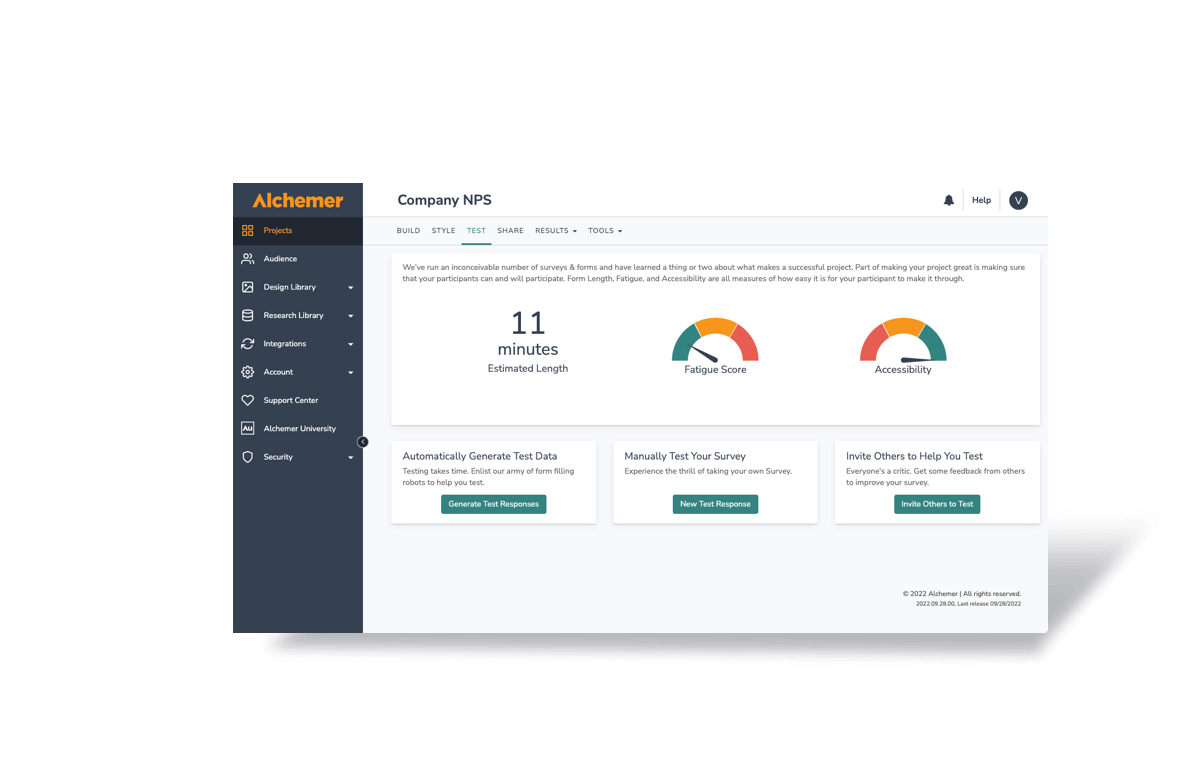Data is an amazing thing. It can help you make better decisions, provide mind-blowing insights, and painlessly clear up long-standing disagreements. But these powers also mean that data needs to be protected.
If it gets inadvertently polluted by well-meaning reviewers or unskilled “analysts,” you could be making crucial choices based on faulty information.
Furthermore, some data isn’t meant to be shared far and wide. Confidential results and personally identifying information (PII) need to stay secure to protect respondents’ privacy.
All these potential pitfalls mean that when you’re using online survey software and you have more than one person on your survey team, your account structure needs to protect the sanctity and privacy of your data.
Here we’ll take a look at a few example situations when data protection matters most, as well as how you can apply these lessons to the way you set up your Alchemer account.
Human Resource Surveys and Data Privacy
For our first example, let’s say your primary use of survey software is for human resources surveys. With all of the data collected between performance reviews to 360 feedback to employee happiness, your account contains highly confidential information about employees.
Marketing sees how much use HR is getting out of the survey tool, so they want to try distributing a survey or two out to customers.
You don’t want to pay for a completely new account, but the private HR data needs to be secured from external access. Fortunately, you can create Stand Alone users to address this problem.
Stand Alone users can only see the surveys they’ve created, regardless of their team or role.
Now marketers can run surveys to customers, and your confidential employee data won’t be at risk.
Handing Off Customer Survey Data
Next let’s imagine that your customer support and user experience teams have been collecting data about customers through service feedback surveys and qualitative interviews, and they’re done with the data.
They understand the value of the information they’ve compiled, however, and they want to pass it off to sales and marketing so they can run their own reports. Obviously, these groups have different interests than support or UX would have, so they’ll want to create different views into the results.
To accommodate this need, each member of the sales and marketing Team within the Alchemer account might be made a Reporter. This Role would allow them to report on the results collected, as well as modify or delete responses.
Reporters can’t create, edit, delete, or distribute a project, nor can they customize its design.
Using this type of Role makes your hard-earned data go farther, by letting different teams create their own ideal data set based on the same round of data collection.
This is Only a Test Survey
Oftentimes we create highly complex surveys that need multiple rounds of testing before they’re ready to be distributed to potential respondents. This job often falls to interns or other very junior employees.
In this case, you want a user who can fully test a complex survey but you want to make sure they don’t inadvertently change the survey’s design or content.
For these times, use the Tester role.
Testers can only generate test data or send test links. They have no access to survey formatting options or distribution capabilities, meaning you can pass the time-consuming (yet crucial) testing of your survey on without worrying that it will get broken during the testing process.
One thing to consider when using this role, however, is that a Tester who has no editing rights won’t be able to fix any problems they discover during testing.
You may decide to customize their role to include modifying, but not creating, projects so they can troubleshoot problems with logic as they go, instead of providing the survey creator with a huge list of “bugs” that need to be fixed separately.
Mirror Your Organization With Teams and Roles
The organizations that get the most out of surveys and data collection are those who bake data into their company culture. Every department thrives on this information, and they all work hard to collect, analyze, and report on it.
So, if you aspire to join the ranks of the truly data-driven, you’ll eventually be adding many different teams into a single tool.
Fortunately, as you incorporate surveys into more parts of your organization, you can simply create new Teams in your Alchemer account that correspond to the departments that want to start collecting data.
Once a survey is assigned to (or created by) a particular team, it’s only visible to users on that team. That means HR can keep their proprietary information distinct from marketing’s social media quizzes, and sales doesn’t need to worry about their post-sale win-loss analysis data.
More About Users, Teams, and Roles in Alchemer
There are a few other options for data protection and survey management in Alchemer’s team edition that we haven’t addressed yet. For example:
Editors: Have full control over a survey project from start to finish. All permissions are enabled.
Publishers: Can test, style, and launch a project, review results, and generate reports. They can’t create, edit, or delete a project or the responses collected.
No Access: You can also create users who don’t have access to any part of the application, which can be useful for billing purposes.
Finally, keep in mind that Alchemer roles are fully customizable. If the out-of-the-box setup doesn’t work for you, you can adjust the permissions given to each role, or create your own.
Account Flexibility Leads to Greater Data Security
The data we collect can’t protect itself; it’s up to us to put systems in place to safeguard it.
The proper account setup, from user permissions to team structures, will help keep your data awesome and actionable.




